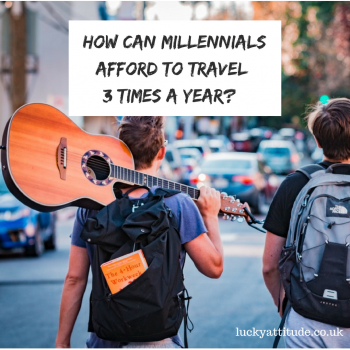Millennials Redefined Global Travel! Completely.

Gap years. Backpacking. Voluntourism. Millennials are innately associated with global travel: 88% of respondents to a survey by Topdeck Travel said they travelled 1-3 times a year – and 97% of them were millennials.
Millennials don’t want the same travel experiences as their baby boomer parents, and as digital natives, the ways they go about organising and embarking upon their global adventures are a far cry from the traditions of the past. They’re the largest generation, and they have completely redefined global travel, probably forever. But how?
Are you experienced?
One look at the Instagram feed of the average millennial traveller is telling. Photos of palm trees, beaches and tropical jungles filled with grinning explorers are a common sight on social media, and offer an insight into what matters most to Gen Y travellers: cultural immersion, and authentic experiences.
The aforementioned Topdeck survey found that local culture and food, for instance, were of particular interest for young travellers. 86% said that culture was an influencing factor, and 69% favoured sampling local cuisine over partying or shopping.
This has put a lot of pressure on travel providers to find new and innovative ways to appeal to consumers. Global travel companies now have to think more about the destinations they offer, and provide globetrotters with plenty of things to experience and do once they arrive. A pleasant pool and bistro are no longer enough to satiate the wanderlust of millennials.
Old money vs. new money
What’s fascinating is this even seems to ring true for the wealthiest millennial travellers, who are abandoning the luxury travel staples of the past.
While affluent spenders from previous generations would aspire to purchase second homes abroad, wealthy millennials are tapping into their wanderlust. By opting for things like fractional ownership through property investment funds, they’re traveling the globe and staying in private accommodation, without being tied to one location.
It’s clear that budget isn’t the issue. Simply put, millennials know that money can’t buy happiness. They care more about absorbing as much of the world, and building as many memories, as possible.
Going (digital) native
Having grown up alongside some of the biggest developments in digital technology (the internet and emergence of smartphones, to name just two), millennials truly are ‘digital natives’. Technology is an utterly integral part of their daily lives, and this is having a big impact on travel.
The affinity millennials have for social media is possibly the most noticeable way tech and travel have melded. 97% of millennials will now post their experiences on social media as they travel, with 75% posting at least once a day. They’re also using social media during the planning stage, with 87% looking to Facebook for travel inspiration.
Travel apps are also one of the biggest developments in recent years – these now account for 5% of all available apps in the Android and Apple marketplaces, and offer all kinds of services to make travel easier, cheaper, and more convenient.
All of this has had a big effect on the services that resorts, hotels and other travel providers need to prioritise – and Wi-Fi is now high on the list of desirable facilities, all over the world.
The rise of digital nomadism
As digital technology has reshaped our personal lives, it has also completely changed the world of work for tech-native millennials. Employees working in industries like graphic design, writing, or marketing can now work completely remotely – and travel-hungry millennials are capitalising on this.
There has been a huge surge in the number of freelancers who are choosing to travel the world as they work. These ‘digital nomads’ combine work with a life of exploration, and have completely changed the meaning of global travel.
Whereas travel was once something you needed to book time off from work to indulge in (and for many it still is), a growing number of millennials have rejected this notion, and a carving the path for an entirely new way of living, working, and travelling.
Sustainability matters
Millennials care more about the environment than any other generation. They are more likely to choose brands or companies that demonstrate a conscious attitude towards sustainability, and they want to be well informed about what they spend their money on (they’re twice as likely to check packaging to ensure a product is recyclable, for instance.)
Travel providers now have to factor this into their services, as black-hat industry practices like ‘greenwashing’ (making a misleading claim about the environmental benefits of a product or service) are likely to be called out by savvy millennials, who expect companies to adhere to authentic certification regulations, like those of the Rainforest Alliance.
Final thoughts
The world of travel has changed, and there’s little to no doubt that millennials have been the driving force behind this. Their desire to experience the world at its very finest, their penchant for digital technology, and their conscientious attitude towards sustainability have redefined the very essence of global exploration, and forced travel providers to rethink their services.
As modern society continues to evolve and develop and a rapid pace, it’s likely that travel will take on yet new and exciting forms. Millennials aren’t the first generation to reshape what it means to explore, and they certainly won’t be the last, but their significance is undeniable – wherever the future takes us, millennials have ensured that the world of travel will never be the same again.
***
This is a guest post by James Hale. Thank you!



